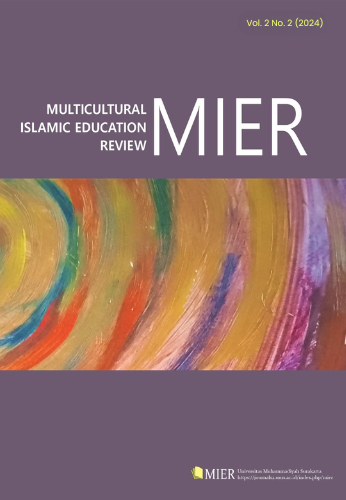The Integration of Islamic Epistemology in Ethical and Multicultural Education: Pedagogical Strategies and Challenges
DOI:
https://doi.org/10.23917/mier.v2i2.7612Keywords:
Islamic epistemology, ethical curriculum, moral development, global citizenship, multicultural educationAbstract
Integrating ethical principles into curricula is crucial for nurturing moral development among students. This study explores the foundational role of Islamic epistemology in shaping knowledge acquisition and ethical conduct. The study investigates ethical curriculum practices in Islamic education through a qualitative research approach combining literature review and content analysis. Islamic epistemology, rooted in Quranic revelations, Prophetic traditions, and scholarly interpretations, delineates knowledge's sources and ethical dimensions. Islamic scholars distinguish between revealed and acquired knowledge, with revelation serving as the cornerstone. The Quran and Hadith provide guidance on faith, morality, and conduct, complemented by reason ('aql/عقل) for critical inquiry and ethical discernment. Drawing from the synthesis of revelation and reason, Islamic ethics guides individual conduct, social interactions, and environmental stewardship. Ethical curriculum development entails integrating Islamic values across academic disciplines, facilitated by pedagogical approaches such as experiential learning, cooperative inquiry, and Socratic dialogue. Challenges including curricular alignment, teacher training, and cultural sensitivity exist, yet ethical curriculum development rooted in Islamic epistemology offers opportunities to cultivate ethical consciousness and foster global citizenship. Upholding methodological rigor and ethical considerations ensures validity and reliability, respecting diverse cultural and religious perspectives. This study underscores the need for further research and collaboration to advance ethical education practices grounded in Islamic principles, responsive to evolving learner needs and fostering ethical leadership in an interconnected world.
Downloads
Downloads
Submitted
Accepted
Published
How to Cite
Issue
Section
License
Copyright (c) 2024 Mahmudulhassan Mahmudulhassan

This work is licensed under a Creative Commons Attribution 4.0 International License.









